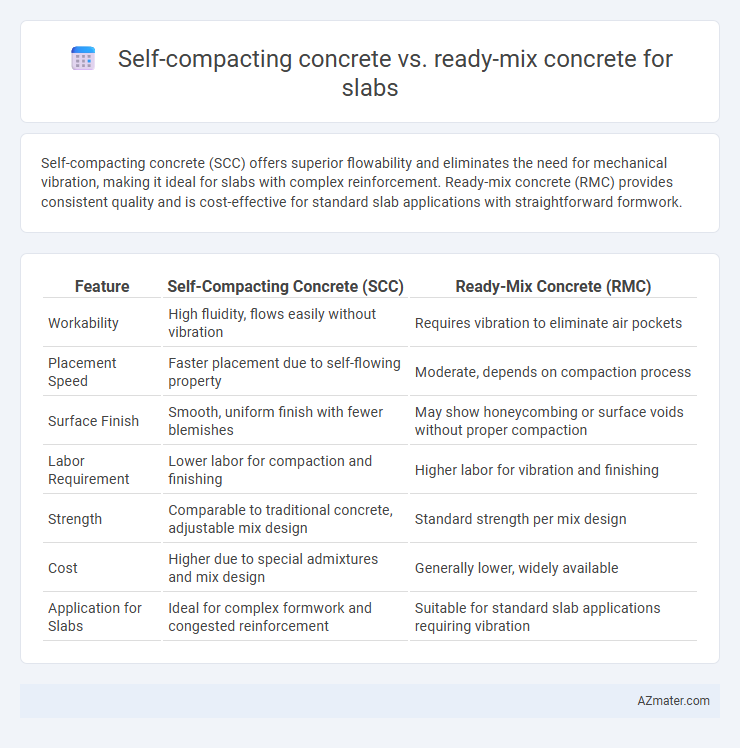Self-compacting concrete (SCC) offers superior flowability and eliminates the need for mechanical vibration, making it ideal for slabs with complex reinforcement. Ready-mix concrete (RMC) provides consistent quality and is cost-effective for standard slab applications with straightforward formwork.
Table of Comparison
| Feature | Self-Compacting Concrete (SCC) | Ready-Mix Concrete (RMC) |
|---|---|---|
| Workability | High fluidity, flows easily without vibration | Requires vibration to eliminate air pockets |
| Placement Speed | Faster placement due to self-flowing property | Moderate, depends on compaction process |
| Surface Finish | Smooth, uniform finish with fewer blemishes | May show honeycombing or surface voids without proper compaction |
| Labor Requirement | Lower labor for compaction and finishing | Higher labor for vibration and finishing |
| Strength | Comparable to traditional concrete, adjustable mix design | Standard strength per mix design |
| Cost | Higher due to special admixtures and mix design | Generally lower, widely available |
| Application for Slabs | Ideal for complex formwork and congested reinforcement | Suitable for standard slab applications requiring vibration |
Introduction: Understanding Concrete Choices for Slabs
Self-compacting concrete (SCC) offers superior flowability and compaction without mechanical vibration, ideal for complex slab forms and congested reinforcement. Ready-mix concrete (RMC) is a versatile, factory-mixed option known for consistency and rapid delivery, widely used in conventional slab construction. Selecting between SCC and RMC depends on structural requirements, site conditions, and project timelines.
What is Self-Compacting Concrete (SCC)?
Self-compacting concrete (SCC) is a high-performance concrete designed to flow and consolidate under its own weight without the need for mechanical vibration, making it ideal for complex slab structures and densely reinforced areas. It exhibits superior workability, stability, and resistance to segregation, resulting in smooth surface finishes and enhanced durability compared to traditional ready-mix concrete. SCC's unique mixture includes high-range water reducers and viscosity-modifying admixtures, optimizing its flowability and cohesion for efficient slab placement and reduced labor costs.
What is Ready-Mix Concrete (RMC)?
Ready-mix concrete (RMC) is a pre-mixed concrete batch prepared in a controlled plant environment, delivering a consistent blend of cement, aggregates, water, and admixtures directly to the construction site. Its precise mix design ensures uniform quality, making it ideal for slab construction where strength, durability, and workability are critical. Compared to self-compacting concrete, RMC requires mechanical vibration for consolidation but offers reliable compressive strength and cost-effectiveness for large-scale slab projects.
Composition and Properties Comparison
Self-compacting concrete (SCC) contains high cement content, chemical admixtures like superplasticizers, and fine aggregates to enhance flowability without segregation, whereas ready-mix concrete (RMC) typically balances coarse aggregates and water-cement ratio for standard workability. SCC exhibits superior filling ability and surface finish with reduced vibration, making it ideal for complex slab forms, while RMC provides consistent strength and durability with conventional placement methods. The lower porosity and higher uniformity of SCC improve resistance to shrinkage and cracking compared to RMC in slab applications.
Workability and Placement Differences
Self-compacting concrete (SCC) offers superior workability compared to ready-mix concrete, allowing it to flow and fill complex slab forms without the need for mechanical vibration. SCC's high fluidity reduces labor costs and minimizes the risk of honeycombing and voids within the slab, resulting in a smoother finish and improved structural integrity. In contrast, ready-mix concrete typically requires vibration during placement to achieve proper compaction, which can increase construction time and labor intensity on site.
Surface Finish and Aesthetic Performance
Self-compacting concrete (SCC) offers superior surface finish and aesthetic performance compared to ready-mix concrete due to its high flowability and ability to fill complex formworks without vibration, resulting in smooth, uniform slabs with minimal voids or honeycombing. SCC's enhanced viscosity control reduces surface blemishes and allows for finer detailing, making it ideal for architectural slabs where aesthetics are critical. Ready-mix concrete may require additional finishing techniques to achieve similar surface quality, often resulting in increased labor and potential for surface imperfections under complex casting conditions.
Strength and Durability Evaluation
Self-compacting concrete (SCC) exhibits superior strength and enhanced durability compared to traditional ready-mix concrete when used for slabs, owing to its high flowability and uniform compaction without mechanical vibration. The optimized mix design of SCC minimizes voids and segregation, resulting in improved compressive strength and resistance to chloride penetration, freeze-thaw cycles, and abrasion. Ready-mix concrete slabs often require additional consolidation efforts, which can lead to inconsistent density and reduced long-term performance under heavy loading and aggressive environmental conditions.
Cost Analysis: SCC vs RMC for Slabs
Self-compacting concrete (SCC) typically incurs higher material and admixture costs compared to ready-mix concrete (RMC), but it reduces labor expenses and accelerates construction timelines for slabs due to its flowability and ease of placement. Cost analysis must factor in SCC's premium pricing balanced against savings from reduced vibration equipment and labor intensity, especially in complex formwork or congested reinforcement scenarios. While RMC presents a lower upfront material cost, potential additional labor and equipment needs for vibration could increase overall slab construction expenses relative to SCC.
Environmental Impact and Sustainability
Self-compacting concrete (SCC) significantly reduces waste and energy consumption due to its highly fluid consistency, which eliminates the need for mechanical vibration and minimizes material segregation. Ready-mix concrete (RMC) involves centralized batching and precise mix control, promoting consistent quality and reducing on-site waste, but may require more transportation energy if sourced from distant plants. SCC's optimized mix design often incorporates supplementary cementitious materials like fly ash or slag, enhancing sustainability by lowering carbon dioxide emissions compared to standard RMC used in slab construction.
Conclusion: Choosing the Right Concrete for Your Slab
Self-compacting concrete (SCC) offers superior flowability and eliminates the need for mechanical compaction, making it ideal for complex slab forms and tight reinforcement layouts. Ready-mix concrete provides consistent quality and is cost-effective for standard slab applications with straightforward design. Selecting between SCC and ready-mix concrete depends on project complexity, surface finish requirements, and budget constraints to ensure optimal slab performance.

Infographic: Self-compacting concrete vs Ready-mix concrete for Slab
 azmater.com
azmater.com